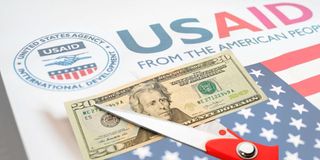Foreign aid cuts could cause more child deaths, warns UN

President Donald Trump recently suspended the operations of the United States Agency for International Development.
What you need to know:
- Children in sub-Saharan Africa are 18 times more likely to die before age five than those in Australia and New Zealand.
The United Nations has warned that aid cuts by the US risk raising the number of child deaths and stillbirths in debt-stricken countries that are still depending on humanitarian assistance. This, says the United Nations Inter-agency Group for Child Mortality Estimation (UN IGME), will erase the gains that had been made to reduce stillbirths and deaths of children under the age of five, which have been on a downward trend since 2015.
According to UN IGME, since 2015, the annual rate of reduction of under-five mortality has slowed by 42 per cent, and stillbirth reduction has slowed by 53 per cent, compared to 2000–2015.
However the aid cuts will affect children as they have already resulted in critical shortages of healthcare workers, clinic closures, disrupted vaccination programmes, and a lack of essential supplies like malaria treatments. The funding cut swill also impede capacity of affected countries to support the most vulnerable children, according to the UN.
World Health Organization Director-General Tedros Adhanom Ghebreyesus noted that “in the face of funding cuts, we must strengthen collaboration to protect children's health”.
Dr Tedros highlighted that almost half of under-five deaths happen within the first month of life, mostly due to premature birth and complications during labour. “Beyond the newborn period, infectious diseases, including acute respiratory infections such as pneumonia, malaria and diarrhoea are the leading causes of preventable child death. Meanwhile, 45 per cent of late stillbirths occur during labour, often due to maternal infections, prolonged or obstructed labour and lack of timely medical intervention.
“Better access to quality maternal, newborn, and child health care at all levels of the health system will save many more lives. This includes promotive and preventive care in communities, timely visits to health facilities and health professionals at birth, high-quality antenatal and postnatal care, well-child preventive care such as routine vaccinations and comprehensive nutrition programmes, diagnosis and treatment for common childhood illnesses, and specialised care for small and sick newborns.”
He added that tackling malaria, preventing stillbirths and ensuring quality care for newborns are crucial.
At the same time, a UN IGME report revealed stark disparities in child survival. The risk of death before age five is 80 times higher in the highest-mortality countries compared to the lowest. Children in sub-Saharan Africa are 18 times more likely to die before age five than those in Australia and New Zealand. Stillbirth rates are also significantly higher in sub-Saharan Africa and Southern Asia.
Data focusing on Kenya shows that 41 children out of 1, 000 born lose their lives before they turn five. The country recorded 27,720 stillbirths in 2021, up from 26,985 in 2010, and 24,599 in 2000. In 2023, Kenya recorded 32,000 neonatal deaths, down from 33, 000 in 2,000.
“Disparities in child mortality across and within nations remain one of the greatest challenges of our time. Reducing such differences is not just a moral imperative but also a fundamental step towards sustainable development and global equity. Every child deserves a fair chance at life, and it is our collective responsibility to ensure that no child is left behind.” said UN Under-Secretary-General for Economic and Social Affairs Li Junhua.
UN IGME members are now calling on governments, donors, and partners across the private and public sectors to scale up access to proven life-saving health practices, nutrition, and social protection services for children and pregnant mothers.





